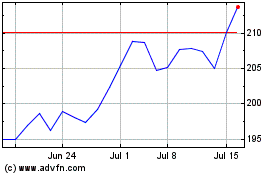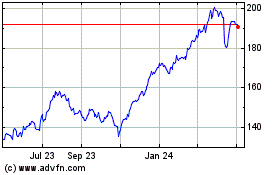By David Benoit, Maureen Farrell and Eliot Brown
This article is being republished as part of our daily
reproduction of WSJ.com articles that also appeared in the U.S.
print edition of The Wall Street Journal (September 25, 2019).
WeWork co-founder Adam Neumann often refers to JPMorgan Chase
& Co. Chief Executive James Dimon as his personal banker. This
week, he was.
In several days of meetings at the bank's Midtown Manhattan
headquarters, Messrs. Dimon and Neumann discussed how to contain
the crisis gripping the startup following its decision to delay its
stock-market debut, according to people familiar with the matter.
Mr. Dimon, as the leader of the bank underwriting the offering, was
advising Mr. Neumann on his options, the people said.
In the end, Mr. Neumann, under pressure from investors and board
members, decided to step down as CEO of WeWork parent We Co., The
Wall Street Journal reported Tuesday.
Mr. Dimon's involvement in the deal is unusual, but so is
JPMorgan's relationship with We. The bank is one of the
office-space company's biggest lenders. Funds it manages are, in
aggregate, We's third-biggest outside investor. It has extended
nearly $100 million in mortgages and other loans to Mr. Neumann
personally. It's one of the lenders behind the $500 million credit
line that allowed Mr. Neumann to cash out a big chunk of his
shares.
All this means that Mr. Neumann's problems are Mr. Dimon's
problems.
Their lengthy conversations this week signal an escalation of
the bank's attempts to salvage a deal that has deteriorated rapidly
due to concerns about We's steep losses, Mr. Neumann's level of
control and his unpredictable behavior. The bank and other advisers
on the IPO had persuaded Mr. Neumann to make some governance
changes, but they weren't enough to keep the offering from going
off the rails.
Investors and rivals are asking if the bank was too tangled up
with We and Mr. Neumann to push for the kind of moves necessary to
keep the IPO on track. The deal's many setbacks -- before it
postponed the offering, the company was preparing to go public at a
third or less than the $47 billion valuation it once claimed --
could jeopardize Mr. Dimon's efforts to make JPMorgan the go-to
bank for promising Silicon Valley startups.
"The governance reflects there are no adults in the room," said
Sam Zell, the longtime real-estate investor, who isn't involved
with We. "The underwriters are as guilty as the board for
instituting a preposterous governance."
For JPMorgan, the We IPO was supposed to be cause for
celebration.
The bank has struggled to win the top job on recent big IPOs,
placing third for much of the past decade behind Morgan Stanley and
Goldman Sachs Group Inc. For Mr. Dimon, cultivating closer ties to
startup founders and investors has become a big priority.
At a news event last year in San Francisco, Mr. Dimon described
the bank's approach to winning their business: Technology bankers,
he said, are the "Navy Seals" hunting for promising entrepreneurs.
Once those relationships were established, the bank sent in its
"army" to supply the young companies with bank accounts, credit
cards and other financial services. Private bankers would manage
the founders' money; investment bankers were standing at the ready
to offer advice on deals.
WeWork was an early test case for the strategy.
In early 2014, a fund managed by JPMorgan invested in the young
company at a $1.5 billion valuation. Around the same time, famed
JPMorgan deal-maker James B. Lee Jr. struck up a friendship with
Mr. Neumann.
Mr. Neumann penned a tribute to Mr. Lee after his sudden death
in 2015. The banker, he said was quick to grasp WeWork's promise.
"He was a living testament to the fact that being a member of the
We Generation is a state of mind and a commitment to a higher-level
existence," Mr. Neumann wrote.
Mr. Neumann also turned to Mr. Dimon for counsel, according to
people familiar with the matter. Mr. Dimon, in turn, took some
advice from Mr. Neumann.
In 2015, when JPMorgan was rethinking its office space, Mr.
Neumann took Mr. Dimon on a tour of some WeWork buildings. Mr.
Dimon was so taken with them that he tore up the design for a new
space near Manhattan's Hudson Yards for the bank's tech operations
and had plans drawn up that closely resembled WeWork spaces, people
familiar with the matter said. JPMorgan paid WeWork $600,000 for
design work on the building, according to a document reviewed by
The Wall Street Journal.
By this time, the bank was lending to both WeWork and Mr.
Neumann. It arranged a $650 million line of credit for WeWork in
2015. The next year, JPMorgan lent Mr. Neumann $11.6 million to buy
a 60-acre estate in the New York City suburbs.
In October 2017, WeWork announced it was buying the Lord &
Taylor flagship store in New York in a splashy deal for a company
that, despite being in the real-estate business, owned few
buildings. JPMorgan led a group of banks that committed $900
million in debt to fund the deal. The day the purchase was
announced, Mr. Neumann closed on a $21 million mortgage from the
bank to buy property in Manhattan's Gramercy Park neighborhood.
JPMorgan funds, meanwhile, continued to invest in the company as
its valuation soared.
Earlier this year, as We's IPO plans began to take shape, Mr.
Neumann bragged to friends and associates that he was meeting with
Mr. Dimon to discuss a massive debt deal that would get people's
attention ahead of the offering.
It was a $6 billion credit line, arranged by JPMorgan and
Goldman Sachs. A laundry list of banks agreed to fund it, provided
We raise at least $3 billion in the IPO.
While such arrangements are common for companies on the verge of
going public, We's credit line was unusually large -- reflecting,
in part, the company's latest private-market valuation of $47
billion.
As the IPO neared and We's valuation ticked lower, some bankers
worried they were extending too much credit to the company and
pushed for a delay, according to people familiar with the matter.
The credit offer expires if We doesn't go public by Dec. 31.
JPMorgan is in line to collect a $50 million fee for arranging the
loan.
Write to David Benoit at david.benoit@wsj.com, Maureen Farrell
at maureen.farrell@wsj.com and Eliot Brown at
eliot.brown@wsj.com
(END) Dow Jones Newswires
September 25, 2019 02:47 ET (06:47 GMT)
Copyright (c) 2019 Dow Jones & Company, Inc.
JP Morgan Chase (NYSE:JPM)
Historical Stock Chart
From Mar 2024 to Apr 2024

JP Morgan Chase (NYSE:JPM)
Historical Stock Chart
From Apr 2023 to Apr 2024
